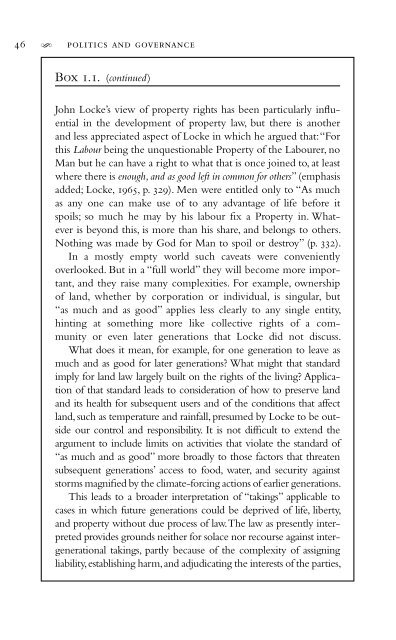Down to the wire : confronting climate collapse / David - Index of
Down to the wire : confronting climate collapse / David - Index of
Down to the wire : confronting climate collapse / David - Index of
You also want an ePaper? Increase the reach of your titles
YUMPU automatically turns print PDFs into web optimized ePapers that Google loves.
46 S politics and governance<br />
Box 1.1. (continued)<br />
John Locke’s view <strong>of</strong> property rights has been particularly infl uential<br />
in <strong>the</strong> development <strong>of</strong> property law, but <strong>the</strong>re is ano<strong>the</strong>r<br />
and less appreciated aspect <strong>of</strong> Locke in which he argued that: “For<br />
this Labour being <strong>the</strong> unquestionable Property <strong>of</strong> <strong>the</strong> Labourer, no<br />
Man but he can have a right <strong>to</strong> what that is once joined <strong>to</strong>, at least<br />
where <strong>the</strong>re is enough, and as good left in common for o<strong>the</strong>rs” ( emphasis<br />
added; Locke, 1965, p. 329). Men were entitled only <strong>to</strong> “As much<br />
as any one can make use <strong>of</strong> <strong>to</strong> any advantage <strong>of</strong> life before it<br />
spoils; so much he may by his labour fi x a Property in. Whatever<br />
is beyond this, is more than his share, and belongs <strong>to</strong> o<strong>the</strong>rs.<br />
Nothing was made by God for Man <strong>to</strong> spoil or destroy” (p. 332).<br />
In a mostly empty world such caveats were conveniently<br />
overlooked. But in a “full world” <strong>the</strong>y will become more important,<br />
and <strong>the</strong>y raise many complexities. For example, ownership<br />
<strong>of</strong> land, whe<strong>the</strong>r by corporation or individual, is singular, but<br />
“as much and as good” applies less clearly <strong>to</strong> any single entity,<br />
hinting at something more like collective rights <strong>of</strong> a community<br />
or even later generations that Locke did not discuss.<br />
What does it mean, for example, for one generation <strong>to</strong> leave as<br />
much and as good for later generations? What might that standard<br />
imply for land law largely built on <strong>the</strong> rights <strong>of</strong> <strong>the</strong> living? Application<br />
<strong>of</strong> that standard leads <strong>to</strong> consideration <strong>of</strong> how <strong>to</strong> preserve land<br />
and its health for subsequent users and <strong>of</strong> <strong>the</strong> conditions that affect<br />
land, such as temperature and rainfall, presumed by Locke <strong>to</strong> be outside<br />
our control and responsibility. It is not diffi cult <strong>to</strong> extend <strong>the</strong><br />
argument <strong>to</strong> include limits on activities that violate <strong>the</strong> standard <strong>of</strong><br />
“as much and as good” more broadly <strong>to</strong> those fac<strong>to</strong>rs that threaten<br />
subsequent generations’ access <strong>to</strong> food, water, and security against<br />
s<strong>to</strong>rms magnifi ed by <strong>the</strong> <strong>climate</strong>-forcing actions <strong>of</strong> earlier generations.<br />
This leads <strong>to</strong> a broader interpretation <strong>of</strong> “takings” applicable <strong>to</strong><br />
cases in which future generations could be deprived <strong>of</strong> life, liberty,<br />
and property without due process <strong>of</strong> law. The law as presently interpreted<br />
provides grounds nei<strong>the</strong>r for solace nor recourse against intergenerational<br />
takings, partly because <strong>of</strong> <strong>the</strong> complexity <strong>of</strong> assigning<br />
liability, establishing harm, and adjudicating <strong>the</strong> interests <strong>of</strong> <strong>the</strong> parties,
















